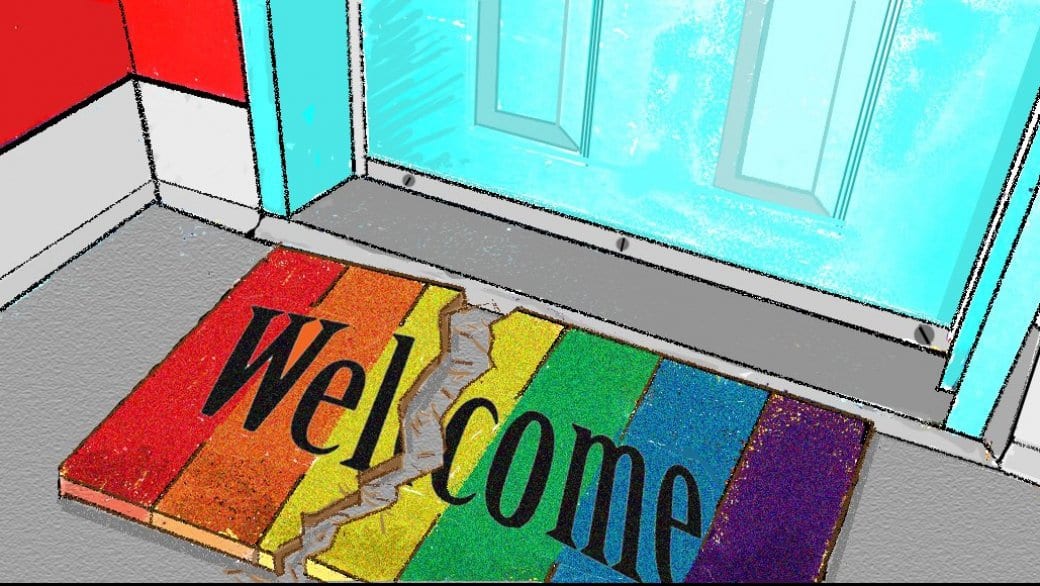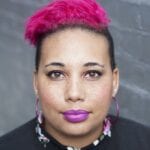I spent much of 2016 focusing my energy and labour into creating safe and inclusive spaces for black, and particularly blaq (black and queer / trans / gender variant) folks. It was a busy and exhausting year but it was rewarding in so many ways.
I founded Black Lives Matter Vancouver along with a group of badass black women and femmes, I spent the summer lobbying for the removal of the police from the Pride parade (due to their racist, homophobic and transphobic historical and ongoing violence) and used my remaining energy to create healing spaces for queer and trans people of colour after events like the Pulse Nightclub shooting and the murders of Philando Castille, Alton Sterling and many more black people.
This work made it so apparent to me how few spaces are inclusive of queer people of colour.
In its overwhelming whiteness, the well-intentioned vigil that was held here in June for the victims of the Pulse Nightclub shooting in Orlando erased the voices and experiences of queer people of colour and the reality that the shooting particularly targeted us and triggered racialized pain. As I wrote in a blog post last year:
“[I] was overwhelmed by [the victims’] brownness. All shades of melanin except the lightest. Why were white people not at the club that night? This is not to say they should have been; this fate could not be wished upon anyone. This is to say fervently: if white queers are not there for us in life, they mustn’t pretend to be there for us in death.”
I keep forgetting, but am always painfully reminded, queerness doesn’t negate racism or anti-blackness. There is as much racism within the LGBT community as there is out of it.
I’m a partygoer and I’m from London — so already the nightlife in Vancouver is sub par to me — but since Orlando and its aftermath, I have felt a heightened sense of frustration, disappointment . . . and fear in queer parties. We need more from white people to make us feel safe. The words I wrote in that blog post still resonate with me, time and time again. Here’s why queer party spaces in Vancouver are largely problematic, racist and unsafe:
Queer parties in Vancouver appropriate black culture to sell tickets
Black culture is cool and everyone wants a piece of it. Particularly in Vancouver, a city with a very small black population and where any remnants of black history have been erased, Blackness seems particularly exotic and exciting.
Vancouver parties like Lick, Hershe, Man Up and Babes on Babes will use hip hop and black artists (none of them local) to entice guests. Based on the ways in which my black friends and I are touched, exotified and stared at, I have little doubt that the partygoers (and even some of the organizers) do nothing outside of this time to engage meaningfully with black people, history and culture.
They don’t care about black people, black death, black unemployment, black mental health, black criminalization. They care (momentarily) about consuming black culture without any of the hard work that comes with real allyship.
On one occasion, a white Babes on Babes MC wore a gold tooth grill and box braids and stood in front of the crowd of mostly white folks using AAVE. At a Man Up ’90s night and later at a Rent Cheque event, a partygoer came in full blackface, gold chains and an afro wig. On a Hershe dancefloor, a white partier asked me if I was here to clean the washroom. Some Vancouver events/people even name themselves after iconic pieces of black culture like “Bye Felicia” or “DJ Bey.”
Drag shows in Vancouver and beyond continually fail to acknowledge the roots of drag culture that lie within black and Latinx communities. On top of this, Man Up (which also continues to use “trans*” as opposed to “trans” in their descriptions) have allowed non-black performers to act “thuggish” or “gangsta” in their portrayals of black artists, which perpetuates harmful stereotypes and trivializes the black struggle.
These instances scream more “fucked-up-culturally-appropriative-problematic-bullshit” than “fun-night-out.”
For white people, these parties are not only fun, but also a chance to momentarily experience the coolness of being black without any of the systemic oppression that we face every other day of the year. For people of colour and especially black queer folks, these experiences are violent, harmful and erasing.
Queer parties practise faux solidarity to gain social capital
Bars, nightclubs and party spaces have always been pivotal sites of revolution for the LGBT community. They have acted as safe havens when regular nightclubs were (and still can be) homophobic and transphobic. Therefore, it is not just to dance that queer folks party, it is also to share space with our community, make connections, build friendships, find allies and feel affirmed.
I have come to expect queer parties to provide a safer space. Parties for oppressed folks act as a form of resistance. Therefore, doing good community work and aligning with anti-oppressive values are quite crucial to the success of these parties. However, whether or not the organizers actually follow through with this work is debatable.
Last year, the work and lived experiences of two black femmes, Ciel Sainte-Marie and Bae Banks, were instrumental in creating an initiative called the “Black Solidarity Fund” for some queer party organizers in Vancouver. Some groups such as Denim Vest, Man Up, Open Relationship and Babes on Babes committed to donate money to Black Lives Matter or other black activist groups as an acknowledgment of the disproportionate consumption of black music that often goes unrecognized. While this gesture is important, it is tokenistic if it is not the foundation for any further acts of solidarity or activism.
Having donated money to Black Lives Matter, the organizers now seem to feel like they have purchased their way into black culture. When I have questioned or confronted them about their blatant cultural appropriation and theft, they cite the Black Solidarity Fund as license.
I also feel discomfort accessing these spaces as a non-binary person, and my friends have voiced similar sentiments. While these events posit themselves as being for the “queer” community (implying an inclusion of folks beyond the LGB community), they still involve a lot of misgendering, referring to the crowd as “ladies,” and other transphobic language.
Some organizers give special treatment to some black people (Read: light-skinned)
Being treated like a celebrity is probably something most people would envy and as an egotistical Sagittarius, parts of me want to like it. However, when I receive special treatment from party organizers as some kind of ploy to be “in” with black people, it’s really harmful and problematic.
One night, at Denim Vest, I was cornered by a Babes on Babes organizer. They told me they had a black rapper coming up from the US to perform and assumed that I would either know who they were or be especially interested (if only they knew I only listen to Nickelback).
Their childish smile implied they were looking for brownie points from the token black queer, but I had none to give them. I watched them later shove their phone into the face of several other bewildered black folks that night.
I realized then that they think black solidarity means a spot on the guest list to their next party and a high-five, rather than the literally hundreds of other (but much harder) forms of allyship.
I decided to test my theory and went to another Babes on Babes event. Organizers had previously given Black Lives Matter members a spot on the guest list but after we cut ties with them concerning their use of gentrified spaces (see below), this no longer applied. Nonetheless, I told the person at the door that “the organizers usually let black people in for free” — and without batting an eyelid I was ushered in like Marilyn Monroe at the Oscars. Within minutes, another organizer was taking my coat and saying, “I don’t want you to wait in line with everyone else” while barging past my surrounding QTIBIPoC friends.
I imagine they expect me to be grateful for this treatment but I can only see it as a hollow attempt at keeping me content so that I don’t write articles like this.
Furthermore, when reporting back to my friends, I realized this special treatment only seemed to apply to me and not to other black folks.
Black queer and trans friends had been pushed, shoved, jumped on, harrassed and misgendered continually by both partygoers and organizers at all of the aforementioned events. This could be for several reasons but most notably because I experience privilege as a light-skinned black person. The racism at play here is so entrenched that it continues to oppress folks with darker skin, and privileges me as the most palatable form of black.
They organize in gentrified spaces
Organizers are choosing to work as colonial settlers on unceded land with (to my knowledge) very little engagement with Indigenous communities beyond a token land acknowledgement on Facebook. In addition, organizers also continue to choose venues that are gentrified. Many clubs were formerly sites of cultural importance to lower income and/or racialized communities.
As my friend Yulanda Lui eloquently wrote in a (now open) letter to the organizers of Babes on Babes after their event was held at Fortune Sound Club: “Vancouver’s Chinatown has been and continues to be facing a terrible and very real threat of fast-moving gentrification, displacing generational family businesses and low income Chinese residents, many of whom are our non-English speaking elders.”
Yulanda engaged with the organizers over a period of almost five months and supported them in considering other venues. But without any further communication with Yulanda, the organizers again held their party in Fortune Sound Club in Chinatown.
Rightfully outraged, Yulanda said online, “I AM ASKING FOR MY QUEER FRIENDS TO NOT ATTEND THIS PARTY and to not actively contribute to the gentrification of Chinatown.” This time, Babes on Babes organizers made a note on their event page acknowledging the call-out, but ultimately ignored Yulanda’s hard advocacy work.
Instead of stepping out of their comfort zone and engaging in real and difficult allyship, the organizers opted to donate to “a group working on cultural preservation and affordable housing advocacy in Chinatown.” To me, it seems pretty counterproductive to “support” a housing advocacy organization while simultaneously participating in the very system that makes housing unaffordable.
I’m sensing a pattern.
Cicely-Belle Blain is a co-founder of Black Lives Matter Vancouver, an artist, poet and youth worker. They would like to thank Olivier Manaelle Marseille, Yulanda Lui and Jabari for their support with this article.
Editor’s note, Feb 3, 2017: A line was added to this article to acknowledge the work of two black femmes who were instrumental in launching the Black Solidarity Fund.


 Why you can trust Xtra
Why you can trust Xtra


